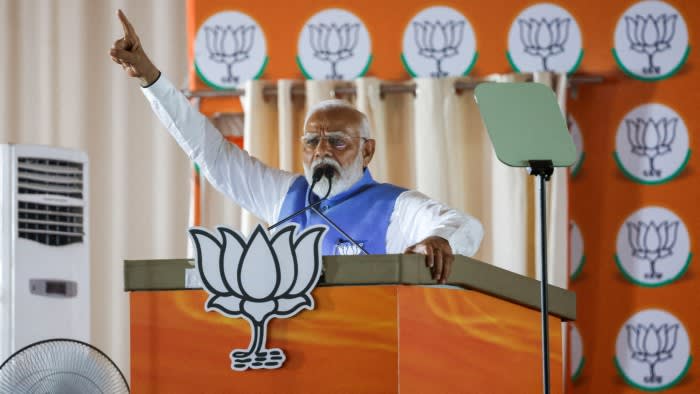Unlock Editor’s Roundup for free
Roula Khalaf, editor of the FT, picks her favorite stories in this weekly newsletter.
Indian markets hit record highs after exit polls predicted a landslide election victory for Prime Minister Narendra Modi, whose third term promises investors a resumption of his infrastructure-led economic drive and market-friendly reforms.
A set of polls released over the weekend by Indian TV stations and agencies showed Modi’s Bharatiya Janata Party increased its presence in India’s lower house of parliament. They also suggested a possible two-thirds majority for the BJP and allied parties that could enable changes to the country’s constitution.
India’s benchmark stock indices closed at record highs on Monday, with the Nifty 50 jumping 3.3 percent and the BSE Sensex hitting 3.4 percent.
The rupee strengthened 0.4 percent against the dollar and India’s 10-year bond yield fell to 6.95 percent from 6.98 percent at Friday’s close. Prices rise as yields fall.
“It could be a little euphoria for a while,” said Raamdeo Agrawal, co-founder and chairman of Motilal Oswal Financial Services in Mumbai, who said the Nifty 50 index could advance 5 to 10 percent over the next week.
A landslide victory by Modi is expected to boost “capital stocks” such as industrial and infrastructure groups, according to Jefferies analysts.
Shares of companies controlled by Gautam Adani, an infrastructure-focused billionaire with long ties to Modi, hit new highs on Monday. Its core ports business grew 12.8 percent.
Reliance Industries, the Mumbai-based petrochemicals-to-telecom conglomerate run by Asia’s richest man Mukesh Ambani, closed up 5.6 percent at an all-time high.
India’s election commission will announce the official results on Tuesday after the conclusion of a seven-phase, multi-week poll in the world’s most populous country.
The Nifty 50 fell 1.9 percent last week amid doubts that the BJP will be able to make good on its 2019 record. Foreign investors sold more than $3 billion of Indian stocks in May. Many have raised concerns about the country’s rich value stocks, which are among the most expensive in Asia.
“Foreigners have eased up significantly going into the election, while domestic investors are positioned quite well on the upside,” said Rajat Agarwal, Asia equity strategist at Société Générale. “Foreigners are more focused on ratings than anything else. . . just from the election result we see a limited advantage.”
A Western diplomat said polls suggesting a landslide victory were surprising, with the BJP doing better than domestic forecasts. The diplomat said the result could pave the way for more “radical” policies under Modi’s third term.
Although exit polls have been wrong in the past, “even a negative result on June 4 is unlikely to change the nature of the decision,” said a note by economists at Axis Capital, a team led by Neelkanth Mishra. who also sits on Modi’s Economic Advisory Council.
The BJP made stewardship of the economy an important part of its election campaign, and investors believe Modi will continue to drive development and address business bottlenecks.
Data released on Friday showed that Indian GDP grew at a better-than-expected year-on-year pace of 7.8 percent in the three months to March. Last week, S&P Global indicated it would upgrade the country’s triple B-minus credit rating as a result of a stable policy environment and high infrastructure spending, along with “deepening economic reforms.”
Modi’s victory “gives her continuity and clarity in terms of policy,” said Amar Ambani, executive director and head of institutional equities at YES Securities in Mumbai. “There is no uncertainty.”
For “a large part” of the week “markets should be moving”, he added. “They’re at a premium, but we’ve seen in the past that valuations can stay rich for a long time, especially if liquidity is strong.”
India’s coalition of opposition parties dismissed the exit polls, with some claiming they were rigged. They also expressed concern over the vote count, which the country’s election commission rejected on Monday, confirming that 642 million Indians had voted.
YES Securities’ Ambani said polls suggested Modi’s BJP, dominant in its Hindi-speaking northern heartland, made gains in the country’s wealthier south, traditionally a base for a number of regional opposition parties.
“This is something that the market will take well, because [the BJP] were perceived as a party of the north, west and center, not so much east and south.”
